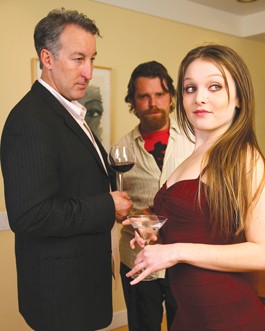In theater, there is often an underlying tension between the written word and the performances of the actors who bring it to life. So often, the script is better than the cast, or vice versa. It is surprisingly rare to discover both at the same time: a theatrical production featuring fine actors all working at the top of their game in a play so good it seems impossible more people haven’t heard of it.
The new show at Sixth Street Playhouse is just that.
The Scene, by prolific New York writer Theresa Rebeck (how has this woman avoided winning a Pulitzer all these years?) is a superbly crafted, four-character immorality tale, so well written and edgily funny and full of nuance and shades of subtlety that it demands to be acted by a quartet of performers who are not merely top-notch, but are also confident, controlled, believable—and fearless.
Under Beth Craven’s masterfully spot-on direction, and working within a cool, rotating set by Paul Gilger, the Sixth Street Playhouse has taken Rebeck’s Scene and delivered a show that perfectly matches the brilliance of the script. Running through Feb. 8, The Scene—which, tragically, could still fail to bring in audiences for the simple reason that few people have heard of it and it’s not a musical—is the year-opening show by which all other productions, at this theater and beyond, should come to be measured.
Charlie (Keith Baker) is an angry, out-of-work television actor who has developed an attitude of unmeasured disdain for the industry that no longer has use for him. Sick of “the scene”—New Yorkers’ double-edged euphemism for the system of party-hopping and schmoozing that constitutes networking within the Big Apple entertainment community—Charlie survives emotionally only by convincing himself he’s better than everyone he encounters, and keeps a roof over his head only because his supportive wife, Stella (Michelle Maxson), maintains a steady job as a “booker” of celebrity guests on an unnamed television talk show. Stella, who hopes to mitigate the unsatisfying repetitiveness of her career by adopting a baby, gently prods her husband to take a meeting with a despised acquaintance who’s producing a television pilot so bad it might actually get made.
To Charlie, Stella’s patient encouragement has become a dagger of deprecating guilt and unworthiness, so when he and his faithful bachelor friend Lewis (Dodds Delzell) encounter the annoyingly ditsy Clea (Rose Roberts) at a party, he unleashes his self-loathing on the vacuous newcomer from Ohio, berating her for her inappropriate use of the world “surreal,” her passive-aggressive way with a vodka and her enthusiastically halting, dim-bulb exclamations: “I’m from Ohio. Isn’t that hilarious?” Charlie also delights in telling her that the “infertile Nazi priestess” (her words) who declined to hire her that morning is, in fact, his wife.
It is only after a lonely Lewis invites Clea to his apartment, and a surprised Charlie drops by to vent after a soul-scarring lunch with the TV producer, that Clea reveals herself to be as smart as she is dumb. Recognizing a way deeper into “the scene,” she seduces the vulnerable Charlie by comparing him to a lion roaming the savannah. Her cruel side appears in the second act, after an afternoon of acrobatic sex in Charlie and Stella’s living room (“I love that you brought me here. It’s so hostile!” Clea says).
When a stunned Stella walks in on them, both she and Charlie are shocked by the budding femme fatale’s boldness. Responding to Stella’s remark that Charlie is her husband and the interloper has no rights, Clea calmly replies, “I’ve been fucking him all afternoon and you haven’t. That doesn’t exactly give me no rights.”
As good as Rebeck’s writing is, the cast match her line for line. Baker and Roberts are sensational, each peeling away layer after layer of artifice to reveal the caustic, empty but thoroughly believable people at their core. Maxson, in what could have been a supporting role, is a tower of wounded strength, and Delzell, as the watchful, careful observer, turns waiting and seeing into an art form, and in this magnificent, must-see play, proves that even on the noisy New York “scene,” sometimes it’s the quiet one who wins the prize.
‘The Scene’ runs Thursday&–Sunday through Feb. 8 at the Sixth Street Playhouse. Thursday&–Saturday at 8pm; Sunday at 2pm. $15&–$26. 52 W. Sixth St., Santa Rosa. 707.523.4185.
Museums and gallery notes.
Reviews of new book releases.
Reviews and previews of new plays, operas and symphony performances.
Reviews and previews of new dance performances and events.











